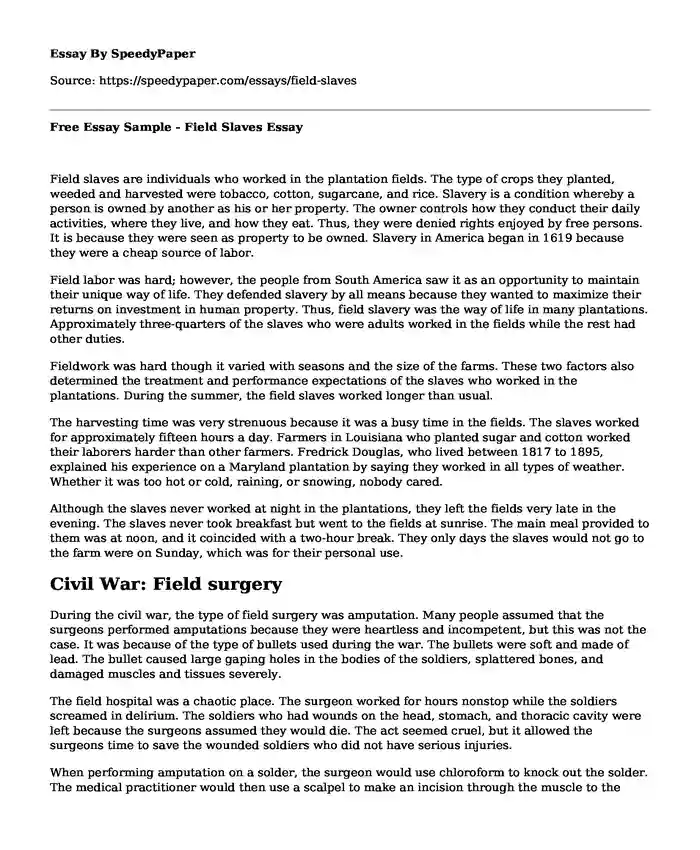
| Type of paper: | Essay |
| Categories: | American Civil War Slavery American history |
| Pages: | 3 |
| Wordcount: | 666 words |
Field slaves are individuals who worked in the plantation fields. The type of crops they planted, weeded and harvested were tobacco, cotton, sugarcane, and rice. Slavery is a condition whereby a person is owned by another as his or her property. The owner controls how they conduct their daily activities, where they live, and how they eat. Thus, they were denied rights enjoyed by free persons. It is because they were seen as property to be owned. Slavery in America began in 1619 because they were a cheap source of labor.
Field labor was hard; however, the people from South America saw it as an opportunity to maintain their unique way of life. They defended slavery by all means because they wanted to maximize their returns on investment in human property. Thus, field slavery was the way of life in many plantations. Approximately three-quarters of the slaves who were adults worked in the fields while the rest had other duties.
Fieldwork was hard though it varied with seasons and the size of the farms. These two factors also determined the treatment and performance expectations of the slaves who worked in the plantations. During the summer, the field slaves worked longer than usual.
The harvesting time was very strenuous because it was a busy time in the fields. The slaves worked for approximately fifteen hours a day. Farmers in Louisiana who planted sugar and cotton worked their laborers harder than other farmers. Fredrick Douglas, who lived between 1817 to 1895, explained his experience on a Maryland plantation by saying they worked in all types of weather. Whether it was too hot or cold, raining, or snowing, nobody cared.
Although the slaves never worked at night in the plantations, they left the fields very late in the evening. The slaves never took breakfast but went to the fields at sunrise. The main meal provided to them was at noon, and it coincided with a two-hour break. They only days the slaves would not go to the farm were on Sunday, which was for their personal use.
Civil War: Field surgery
During the civil war, the type of field surgery was amputation. Many people assumed that the surgeons performed amputations because they were heartless and incompetent, but this was not the case. It was because of the type of bullets used during the war. The bullets were soft and made of lead. The bullet caused large gaping holes in the bodies of the soldiers, splattered bones, and damaged muscles and tissues severely.
The field hospital was a chaotic place. The surgeon worked for hours nonstop while the soldiers screamed in delirium. The soldiers who had wounds on the head, stomach, and thoracic cavity were left because the surgeons assumed they would die. The act seemed cruel, but it allowed the surgeons time to save the wounded soldiers who did not have serious injuries.
When performing amputation on a solder, the surgeon would use chloroform to knock out the solder. The medical practitioner would then use a scalpel to make an incision through the muscle to the bone. After that, the surgeon would use a bone saw and saw it through the bone until he successfully cut through it. The arteries would be tied with cotton threads or silk to prevent the patient from bleeding out. The edges of the bone would be scraped smooth, and the stump would be wrapped using plaster or a bandage. The solder would later wake up from the surgery thirsty and in pain. Due to the unhygienic nature of the field hospitals, the soldiers suffered from infections, and many of them died.
Bibliography
Douglass, Frederick, and Rayford Whittingham Logan. The life and times of Frederick Douglass. Courier Corporation, 2003.
Hughes, Louis. Thirty Years a Slave, from Bondage to Freedom: The Institution of Slavery as Seen on the Plantation and in the Home of the Planter: Autobiography of Louis Hughes. Negro History Press, 1897.
Kolchin, Peter. "American Slavery: 1619-1877, consulting ed." Eric Foner, Hill, and Wang: New York (1993).
Cite this page
Free Essay Sample - Field Slaves. (2023, Aug 01). Retrieved from https://speedypaper.com/essays/field-slaves
Request Removal
If you are the original author of this essay and no longer wish to have it published on the SpeedyPaper website, please click below to request its removal:
- Essay Sample on Human Trafficking around the World
- Essay Example on Hostage Negotiations with Terrorists
- Essay Sample on Unethical Political Behavior
- Cultural Diversity and Business Environment - Discussion Paper Example
- Are Men Obsolete? - Critical Essay Sample
- Essay on U.S. Population & Cultural Diversity: An Overview of America's 325M+ People.
- Exploring Intersectionality in Psychotherapy: Experiences of AfroLatinx Queer Immigrants - Free Paper
Popular categories




